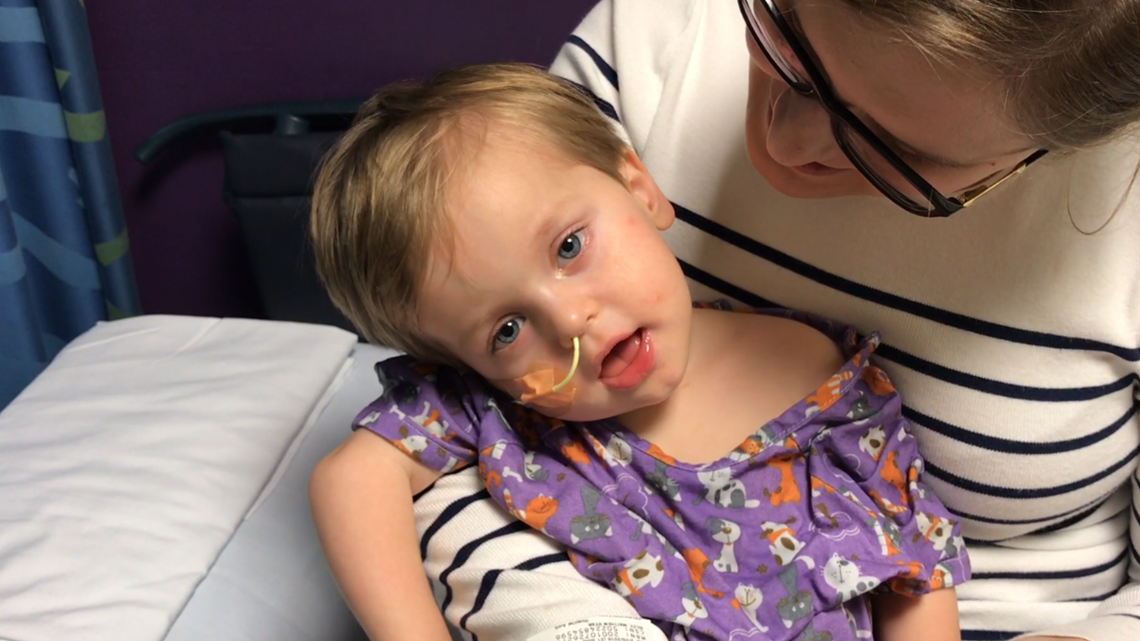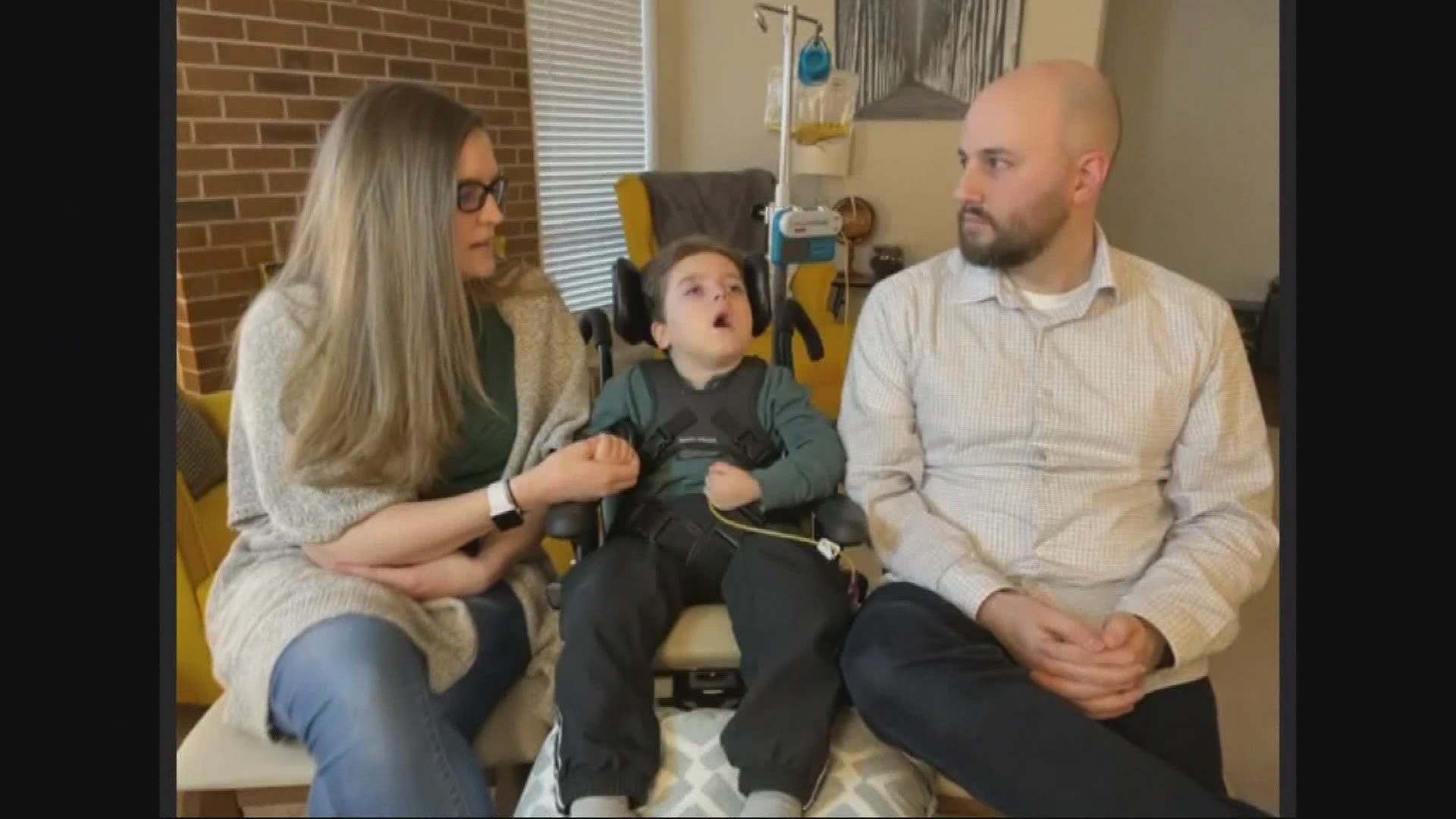BEAVERTON, Ore. — Editor's note: An earlier version of this story included comments from the Monacos' physician, Dr. Paul Thomas. KGW News has since learned that Thomas' medical license was suspended by the Oregon Medical Board on December 3, 2020, and he is not allowed to practice medicine in the state of Oregon.
To understand Joe and Nikki Monaco's pain, you must first know their son Emmett's heart. The Beaverton couple recalls that even at 16 months old, it was clear that Emmet had a kind spirit.
“He would actually go over to a kid who didn't have a toy and give that kid a toy,” said Joe Monaco. “Emmett has this altruistic attitude.”
Those glimpses gave the Monacos hope that Emmett would one day make the world a better place. But when Emmett was around 18 months old, their hope began to fade.
“He started to lose his skills,” said Joe.
At first, the symptoms were subtle: severe constipation, difficulty walking and missed milestones. Then came painful seizures, muscle spasms and blindness. Several misdiagnoses later, the Monacos learned Emmett had Krabbe disease, a severe neurological condition caused by an enzyme deficiency.
“As toxins build up in his nerves, his nerves die,” Nikki Monaco explained.
Today, Emmett is 5 years old. His only way of communicating is by blinking, and doctors don't expect him to live past the age of 10. Most children with Krabbe disease don't make it past their second birthday.


It's enough to explain the Monacos' pain, but there are other factors that make that pain more acute. There's an infant blood test that screens for Krabbe that the Monacos didn’t know about when Emmett was born. And while there is no cure for the disease, doctors have developed a new treatment that vastly improves a child's chances if they receive it before symptoms appear.
It's one reason the Monacos are so passionate about letting others know about the blood test for Krabbe.
“It's important to get kids screened at birth,” said Nikki.
The Oregon State Public Health Laboratory has had the equipment to test for Krabbe for several years. They use it to process Krabbe tests for private citizens, many of whom live outside the state. But they don't automatically screen babies born in Oregon for Krabbe.
“You just hope the state that you live in is able to screen for every possible thing,” said Joe.
The Monacos are fighting to make that happen. House Bill 2987 directs the Oregon Health Authority to expand newborn screening. It would require every baby delivered in Oregon to be tested for multiple diseases, including Krabbe.
“So that future families can be saved the pain that ours has had to go through,” said Nikki.
State Rep. Susan McLain (D-Hillsboro) is sponsoring the bill.
“It just feels like it's real life, and it's really important,” said McLain.
McLain added that she believes in addition to helping protect children's health and saving families grief, testing for Krabbe could save the state millions of dollars in long-term care costs.
“My goal is that we'd be able to use Krabbe as an example of where there are changes in genetic diseases and treatment,” said McLain. “It's extremely important since we have the machine that would [test for] Krabbe that we add it to our protocol list.”
Right now, eight states require Krabbe screening for infants, including New York, Ohio and Indiana. When asked why Oregon doesn't require the test, the Oregon Health Authority provided KGW with this statement:
"Our hearts go out to families facing Krabbe disease and other rare and life-threatening diseases in infants. Oregon's public health lab conducts timely newborn screening to find serious disorders in infants that can be treated. The state's laboratory's screening criteria are developed by an independent panel of medical experts. This panel has not recommended that the state public health laboratory test for Krabbe disease.”
David and Tammy Wilson, of Dayton, make their own case for why Oregon should test for Krabbe. Their son Marshall died from the disease when he was 6. When their younger son Michael was born, the Wilsons knew they had to have him tested for Krabbe. The test came back positive. Doctors immediately treated Michael with a stem cell transplant. Today, his family says Michael is 10 years old and symptom-free.
“He’s in uncharted medical territory,” said Tammy Wilson. “Michael wouldn’t be alive without the transplant, and we wouldn’t have known to have him tested if it wasn’t for his brother. We believe the reason Marshall was born was to save Michael’s life.”
For the Monacos, it's a bittersweet reminder of their goal to require universal testing, and what it could have meant for their family.
“To see [Michael], who was treated, running around our living room, knowing that wasn't an option for Emmett, that was really hard,” said Nikki through tears.
About a year ago, the Monacos screened their youngest son Leo for Krabbe right after he was born. The test came back negative. They want to give every Oregon family that same sense of relief, or at least a fighting chance against Krabbe.
Joe and Nikki Monaco believe this effort is how their son Emmett will indeed make the world better place. They hope lawmakers will recognize that and support it.
“Nothing is going to change for Emmett,” said Nikki. “But we want to make sure Emmett's life has meaning and that he can leave a legacy.”

